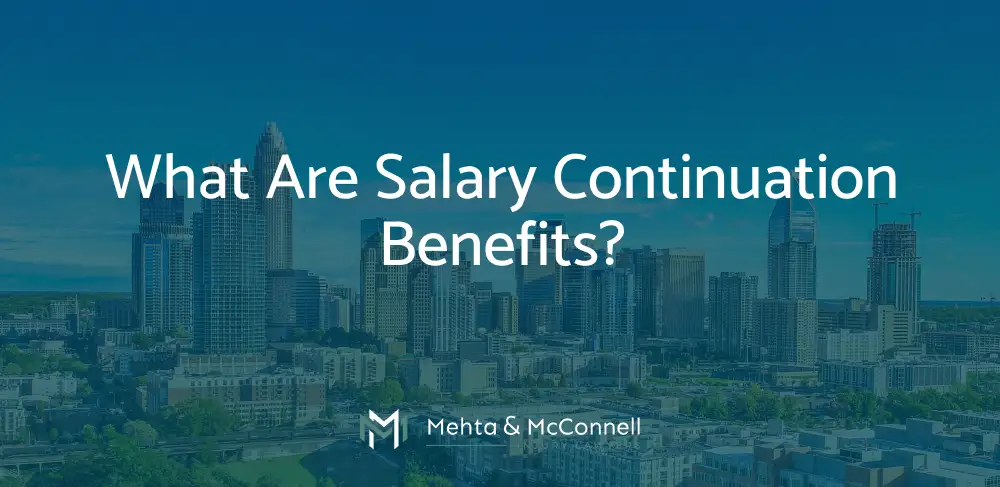 Workers' Compensation
Workers' Compensation
As a North Carolina State employee navigating a workers’ comp claim, you might be eligible for salary continuation benefits.
Salary continuation lets an injured worker’s employer pay full wages and benefits after a job-related injury, instead of receiving temporary total compensation from the BWC.
This program can provide your pre-injury wage if you were injured in a qualifying event.
However, salary continuation only applies to specific state employees, such as certain law enforcement officers, teachers, and other specialized roles within the state’s workforce.
Understanding wage continuation pay is crucial if you think you might be eligible.
Read on to learn more about salary continuation benefits in a workers’ compensation claim context, including eligibility criteria, benefit period, and other details.
If you have questions or think your government employer wrongfully denied your salary continuation, please contact the experienced lawyers at Mehta & McConnell, PLLC for a free, no-obligation consultation.
What Is a Salary Continuation Benefit?
Salary continuation ensures employees receive base wages during a leave of absence, following the employer’s paid leave policy and extending beyond any benefits waiting period.
Salary continuation compensates injured employees for lost wages due to compensable injuries.
These payments can replace or exceed temporary disability indemnity. Employers must follow the necessary notice requirements associated with temporary disability benefits.
In North Carolina, salary continuation, or wage continuation pay, aims to offer 100% of your pre-injury wage if you’re eligible and on workers’ comp.
While standard workers’ compensation temporary wage payments usually cover only two-thirds of your salary, salary continuation covers your full salary.
However, there may be a waiting period, and only certain government workers will be eligible.
Who Can Receive Salary Continuation Benefits in North Carolina?
Two main categories of workers can receive salary continuation benefits — certain law enforcement officers and full-time teachers.
Law Enforcement Officers
North Carolina law strictly regulates eligibility for benefits in relation to workers’ compensation claims.
Law enforcement officers governed by the Criminal Justice Training and Standards Act can qualify for up to two years if the injury occurred under specific conditions.
Conditions include episodes of violence, resistance, or other hazardous situations encountered during official police duties.
Examples of state law enforcement officers who can receive wage continuation pay include parole and probation officers, correctional officers, and Highway Patrol.
State Bureau of Investigation (SBI) and Alcohol Law Enforcement (ALE) agents are also eligible. Law enforcement at a local level does not qualify to receive wage continuation.
You can see the complete list of qualifying law enforcement positions here.
Public Teachers
North Carolina public school teachers also have similar eligibility criteria if injured due to an “episode of violence.”
Additionally, full-time employees at state-level educational institutions might qualify. Part-time teachers and substitute teachers are not eligible for benefits under the plan.
If you fall under one of the eligible categories, you can receive benefits for the shortest of these periods:
- One year,
- Continuation of your disability, or
- Lost time from work due to your injuries.
Employees under both categories who receive salary continuation benefits will still be eligible for workers’ compensation benefits other than temporary total weekly wage pay.
What Happens After the Salary Continuation Period?
If you are still disabled after your wage continuation pay expires, you transition to the standard workers’ compensation payments. These are the payments that typically cover two-thirds of your salary.
You still accrue time toward various benefits while on salary continuation benefits, such as sick leave and vacation time.
However, some benefits might temporarily stop while on workers’ compensation.
One example is your retirement service credit. Employees must purchase credits for the time they missed while on workers’ compensation.
Other Benefits for Injured State Workers
If you don’t qualify for salary continuation, you might have other government-sponsored programs that can provide some assistance after a work-related injury.
Some examples include:
- Police separation allowance,
- LGERS disability income and retirement plans (local government employees),
- State Employee Health Care Plan (SEHP), and
- Firefighter and rescue squad benefits.
If you are a North Carolina government employee and suffered an injury on the job, inquire about all possible benefits you’re entitled to.
Salary continuation is just one option that applies to a select group of North Carolina government employees.
What is Salary Continuation?
A salary continuation plan is a written agreement made before any disability occurs that outlines how an employer will pay an employee who becomes disabled. The employer may continue paying all or part of the employee’s salary for a set period, ensuring financial stability during recovery.
Understanding workers’ comp salary continuation benefits is often complex, requiring a legal advocate with extensive experience in government employee workers’ compensation claims.
If you believe you qualify for salary continuation benefits, you must contact your plan administrator and human resources manager to verify eligibility.
Contact a North Carolina Workers’ Compensation Lawyer
If you’re receiving workers’ compensation benefits and believe you’re being unfairly denied wage continuation pay, the skilled legal team at Mehta & McConnell, PLLC can help.
We only handle work injury and personal injury matters and have over three decades of combined legal experience. Mehta & McConnell is entirely devoted to helping individuals seek justice for their injuries.
Workers’ comp and salary continuation benefits are complicated legal topics. However, you don’t have to try to understand them on your own.
If you have questions about how this program applies to your specific situation, don’t hesitate to contact Mehta & McConnell for a free consultation.
Your financial well-being after a work-related injury shouldn’t be an added burden. With proper guidance and our legal counsel, you can focus on what matters the most—your recovery.

